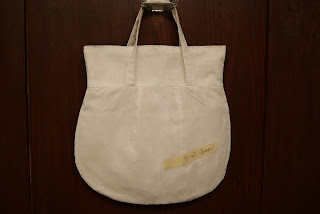"An investment in knowledge always pays the best interest."
-Benjamin Franklin
 |
| Margarita, Ramona, and Ramona with the finished sample product |
The summer start-up program came to an end on August 19. The project was capped off with a graduation ceremony; the women received certificates of completion for the business and design course and we took time to reflect on the six weeks we had spent together.
 |
| The certificate each woman received for successfully completing the program |
"Thank you, Jose and Morgan, for working with us. No one has ever come here to teach us with both authority and understanding. We have all learned a lot from this course, and with God's help, we will be able to use these new skills in our business, so that we can all make a better future for our families." -Margarita Mets
 |
| Nathaly receiving her certificate |
The women were also briefed in detail about the loan agreement they will have with Nest. AMCVA's president, Ramona, signed the loan agreement for the cooperative. They recieved their repayment schedule, and were excited to learn that not only are they to receive a 2,000 USD loan from Nest that will fund the costs for beginning production, but that they already have their first order. The Pujols Family Foundation has placed a large order for hand bags from the cooperative. This initial order will allow the women to immediately earn income from their new venture, while simultaneously beginning their loan repayment.
 |
| Signing the formal loan agreement |
So much has changed in Batey Aleman this summer. The community has its first working production project, ideally centered in the center of the community: a prime location to motivate others to enter into small business ventures. The sewing studio, elevated above mainstreet on the second floor of its building, represents so much more to these women than just the products it will produce.
 |
| One of the final sample products |
This studio represents a group of eleven women who have only known poverty and devastation, and yet are finding empowerment in learning a simple skill. The next few months are going to be challenging; they will learn to organize themselves to work efficiently together, to manage their time wisely and work together to reinvest in their business. The stream of steady income will keep them focused, the joy and relaxation they find in their craft with keep them motivated, and the support from each other will keep them secure.
.JPG) |
| Looking back at one of the first days in the classroom |
We are so thrilled to have successfully completed the first phase in Nest's newest program. The next (and even more exciting) phase is beginning, and this is where we'll begin to see the biggest changes yet.
 |
| The studio in full swing |
To the Asociacion de Mujeres de Costura de Villa Aleman:
Jose and I are so proud of you. Your hardwork and love for your families has been inspiring to us, and we have learned so much from your ingenuity and drive to succeed. We know that these next few months will be an entirely new experience for you all and we're confident in your ability to succeed and make this project bigger and better than we could ever envision. We look forward to watching the business grow, and can't wait to see the difference your work will make in the lives of your families, the futures of your children, and the development of the entire community.





.JPG)


%5B1%5D.JPG)


































